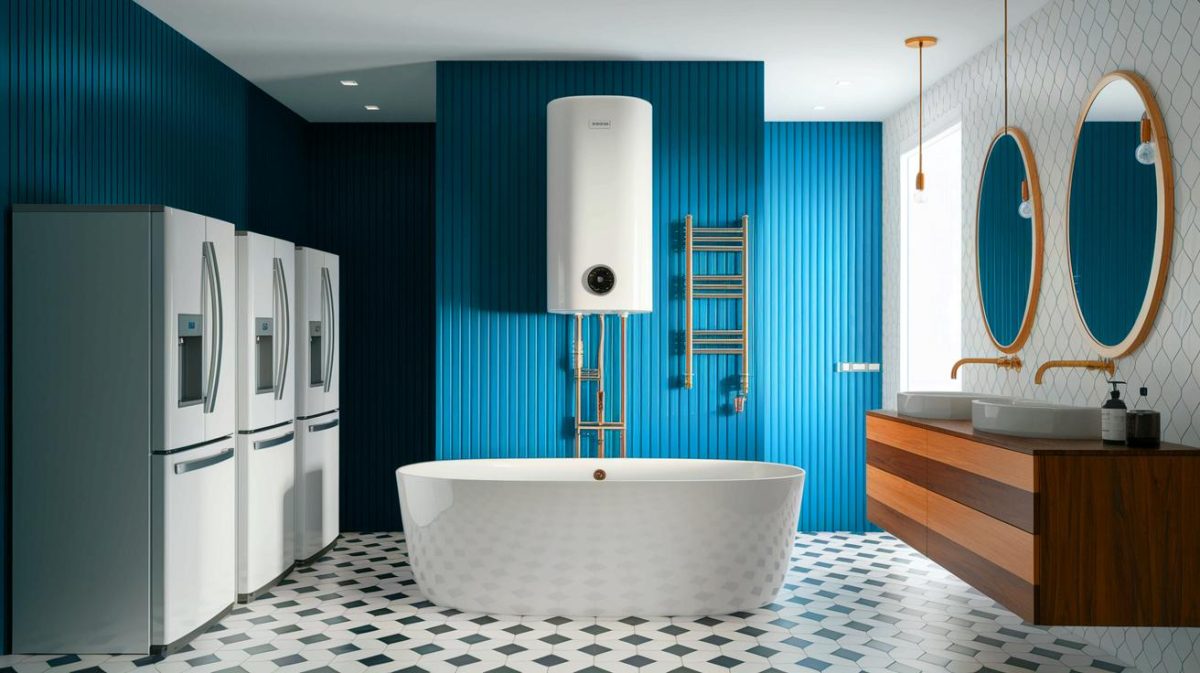| IN A NUTSHELL |
|
In today’s world, where managing electricity consumption has become a crucial ecological and economic challenge, one household appliance stands out for its exceptional energy consumption. The intensive use of this device can equate to the simultaneous operation of 65 refrigerators. Understanding the energy dynamics of common household appliances can empower us to make more sustainable choices that benefit both our wallets and the environment.
An Energy Monster in the Bathroom
The electric water heater is a significant energy consumer. When in use, it consumes between 3,000 and 5,500 watts, primarily for hot showers. In stark contrast, a modern refrigerator averages between 35 and 40 watts per hour. This means that a few minutes in a hot shower equate to several hours of operation for dozens of fridges. It’s a staggering comparison that highlights the potential impact of daily habits on energy bills.
In many households, the electric water heater can significantly inflate the electricity bill. In France, it accounts for approximately 12 to 15% of a household’s annual energy consumption, according to the Agency for Ecological Transition (ADEME). These statistics underscore the importance of selecting a water heater that meets household needs while promoting energy-efficient practices.
Why Does It Consume So Much?
The operating principle of an electric water heater is simple yet energy-intensive: it heats water on-demand using a resistance, which requires a tremendous amount of instantaneous energy. Unlike gas heaters or solar systems, it does not benefit from any alternative or deferred energy sources, thus relying entirely on electricity.
Moreover, many models lack precise temperature regulation systems, prompting users to frequently turn the device on and off or extend shower durations to achieve a comfortable temperature. This inefficiency in temperature management further exacerbates its energy consumption, making it a less sustainable choice compared to its alternatives.
What Are the Alternatives to Reduce the Bill?
For individuals looking to lighten their consumption, several options are available:
- Investing in more energy-efficient water heater models with high energy ratings.
- Installing solar-powered systems, which heat water without additional electricity costs.
- Limiting shower duration and reducing water temperature.
- Using aerators or flow reducers to decrease the volume of heated water.
The electric water heater’s energy consumption is a stark reminder of how domestic equipment choices can have a massive impact on both the environment and finances. Even a simple daily act, like taking a shower, can lead to significant energy expenditure, especially when imagined as running 65 refrigerators simultaneously.
The Environmental and Financial Impacts
The implications of such energy consumption extend beyond individual households. On a larger scale, excessive electricity use contributes to environmental degradation. Reducing reliance on high-energy appliances can lead to substantial reductions in carbon emissions, aiding efforts to combat climate change.
Financially, households can benefit from adopting energy-efficient appliances and practices. By reducing electricity use, families can save on utility bills, freeing up resources for other needs or investments. It’s a win-win situation that promotes both sustainability and economic efficiency.
As we become more conscious of our energy use, it’s essential to consider the impact of our everyday appliances. By making informed choices, we can contribute to a more sustainable future. What steps will you take to reduce your household’s energy footprint?
Did you like it? 4.6/5 (25)









Wow, I had no idea water heaters were such energy hogs! 😲
Are they referring to tankless water heaters? I replaced my gas water heater with an electric one and have not noticed any changes in my electric bill.
That seems improbable due to the fact that the water heater takes electricity to keep the water hot
Does anyone have recommendations for energy-efficient models?
Heat pump water heaters use a third or less of the power of regular electric water heaters.
Yes! Heat pump water heaters (HPWH)!
As described by one manufacturer, “heat pump water heaters use heat pump technology to pull ambient heat from the air around the water heater. This allows them to heat water more efficiently, so they offer some attractive benefits for homeowners. They can deliver significant savings on your energy bills and are environmentally friendly.”
bradfordwhite (dot) com (slash) heat-pump-water-heaters
Eight days ago, I switched from gas-fired WH to a HPWH. Although I’m now using electricity as the energy source, the new unit I selected has a Uniform Energy Factor (UEF) of 3.64, whereas the former gas unit had an Energy Factor (EF) of 0.62. (Sixty two percent of each unit of gas was used to heat water, and 38% was lost in the process.) The net: the new HPWH will consume nearly six time less energy (5.87 to be precise) to deliver 120F to the tap.
Interestingly, the HPWH contains the same upper and lower heating elements that exist in a conventional electric water heater (where both a conventional unit and the HPWH consume 4000 watts), but the heating elements in the HPWH are energized only in high demand situations where the heat pump alone (which consumes only 500 watts, less than the average microwave oven) is unable to recover to 120F.
Two more things, both financial: (1.) My electricity supplier offers a $600 rebate that the plumbing contractor applied directly to my quote. (2.) For 2025, HPWHs are eligible for a tax credit of 30% of the project cost, up to a max of $2000. So, provided that the tax code remains as-is through Dec 31, I should see a credit of about $1470 in 2026.
65 refrigerators?! That’s insane! 😱
Thank you for shedding light on this hidden energy monster. 🙏
Are there any government incentives to switch to solar heaters?
What about tankless water heaters? Are they more efficient?
Maybe it’s time to take shorter showers… 🚿
How do I determine if my water heater is energy-efficient?
Unless it’s a Heat Pump water heater, it is not the most efficient. Gas or propane is also more efficient than electric resistance, but not nearly as efficient as a heat pump model.
LOL, I’ll never look at my water heater the same way again! 🤣
Do other appliances have hidden energy costs like this?
Is there a way to monitor the energy consumption of my current heater?
Thanks for the tips on lowering my electricity bill. 💡
Why is temperature regulation so inefficient in these devices?
Are older models worse in terms of energy usage?
I’m curious if switching to solar power is cost-effective in the long run.
I wonder how a gas heater compares in energy usage? 🤔
Can we get a follow-up article on water heater alternatives?
Thanks for the warning! Definitely going to check my utility bill. 😬
What are aerators and how do they help in saving energy?
My electric bill is already high, can’t imagine adding a water heater to it. 😩
I think I’m going to look into getting a solar-powered system!
Is it possible to retrofit an existing water heater to make it more efficient?
Great info, but I’m skeptical about the 65 fridge comparison. 🤨
So staying with electric, is a on demand wh more efficient? Also propane vs heating oil burner?
Does anyone know if smart thermostats can help with this issue?
Great article! Thanks for the insights. 👍
Wait, how can a water heater use as much energy as 65 fridges? 😕
We have been using a propane tankless water heater for thirteen years with a water softener. This thing provides 130 degree water the whole time we use it and then shuts off. I do not see where electric anything could be any better considering the tank aspect and the fact that most electric power is generated by fossil fuels or coal. Also the original cost is much less than heat pump technology, but I’m sure the politicians know better.
You did not even mention on demand water heaters. Do your research before writing these articles
This was really eye-opening, I need to rethink my energy usage.
Yes! Heat pump water heaters (HPWH).
As described by one manufacturer, “heat pump water heaters use heat pump technology to pull ambient heat from the air around the water heater. This allows them to heat water more efficiently, so they offer some attractive benefits for homeowners. They can deliver significant savings on your energy bills, and are environmentally friendly.”
Eight days ago, I switched from a gas-fired WH to a HPWH. Although I’m now using electricity as the energy source, the new unit I selected has a Uniform Energy Factor (UEF) of 3.64, whereas the former gas unit had an Energy Factor (EF) of 0.62 (meaning 62% of each therm of gas went toward heating water and 38% went to waste%). The net: the new unit will consume nearly six times less energy (5.87 to be precise) to deliver 120F to the tap. Interestingly, it contains the same upper and lower heating elements that exist in a conventional electric water heater (where eHW and HPWH units both consume ~4000 watts), but the HPWH elements are only energized in high demand situations where the heat pump alone (which consumes only 500 watts, less than the average microwave oven) is unable to recover to 120F.
Two more things, both financial: my electricity supplier offered a $600 rebate that the plumbing contractor applied directly to my quote, and heat pump water heaters installed in 2025 are eligible for a tax credit of 30% of the project cost, up to a maximum of $2,000. So, provided that the tax code doesn’t change before Dec 31, I’d see a credit of ~$1450 in 2026.
What about us peons that have Natural Gas water heaters. What’s their energy usage compared to electric. I’ll be it’s a heck of a lot less.
Can someone explain how flow reducers work?
I have had natural gas/propane tankless water heaters for decades. And they work beautifully. I am retired and travel a lot so there is no heating of water while we are gone or asleep at night. Their lifetime is four to ten times that of tank-type water heaters. Most of tank-type water heaters energy is spent on heating the same water over and over without using it. And with a tankless water heater, the hit water never runs out.
(What’s going on w/the comment feature of this web site? The comments icon next to the author’s name at the top of the page currently shows “3,” but I know I saw “24” at one point. When I refreshed the page to see if my comment went through, the total went back to “3”.)
Is it really worth the hassle to install a solar system?
Your math is very faulty, if “dozens” of fridges is 24 or more. Recalculate.
Typical trash article. Clearly the author doesn’t understand the difference between energy and power. “Watts per hour” is meaningless nonsense.
This article is old news. The water heater industry and utilities are rapidly moving toward adoption of both tankless water heaters and the latest innovation, hybrid water heaters. Hybrid water heaters are heat pumps, basically refrigerators in reverse for water heating. Because they are extremely efficient to convert electrical energy to heating water, with the byproduct of creating chilled air that can be captured, they cost less to operate.
Heat pump water heaters are much more efficient than traditional resistance models. There are multiple options and possibly rebates from your electric company for switching. I’ve been using one for three years and it definitely helps reduce our electric bill.
Ha! Leftists forced many developers to stop using natural gas hot water heaters, like they did for on my new Austin townhome. The 50 gal heater is terrible. It can’t fill our tub with warm water before going totally cold.
And now outfits like this site are complaining! They got what they wanted!!
Taking shorter showers does almost nothing to reduce electricity use, unless you’re taking 2 hours showers. The real electricity consumption comes from keeping the water in the tank all day, even when no one is using hot water. Reducing the temp of water in the tank makes a far bigger difference than taking shorter showers, in spite of the fact that you end up using more hot water for each shower.